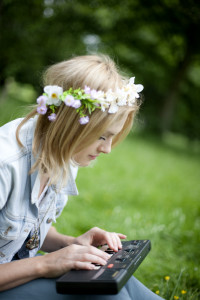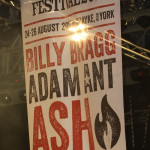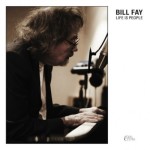
I’ve long been a fan of Gwenno’s music. The first time I saw The Pipettes, at the Track & Field All-Dayer May 2005, I turned to Harvey Williams, who had hipped me to them, and said ‘This is everything music should be!’ I then proceeded to see them 4 times in the next 9 days. In 2008, enchanted by Gwenno’s solo U & I EP, especially the wistful dreamy perfection of ‘Lime Chordial’, I made the trip down to Brighton to see her first solo gig at the Moksha Café, where along with those lovely songs we were treated to an encore duet of ‘Don’t Go Breaking My Heart’ with Stuart Flynn. So when I heard she had a new EP out, Ymbelydredd on Peski Records, I was excited to hear it, despite it being sung entirely in Welsh and me not knowing a single word of the language. Music transcends such things and the synthpop here is gorgeous. Glowing ghosts of growing up dance along with darker undertones in those memories. The wonderfully sweet ‘Despenser St.’ has been on my stereo and stuck in my head for weeks now. You can listen to the EP here and if you’re curious about what Gwenno’s singing, English translations of the lyrics are at her Tumblr. I emailed Gwenno to chat about the songs, her native tongue, and plans for the future.
There seems to be a lot going on in ‘Ymbelydredd’, a wide-range of emotions – love, uncertainty, pleasure in life’s little joys, danger…
I was trying to capture the feeling of the summer holidays in Cardiff during the 90s when I was in secondary school and how carefree you feel when someone else is paying for the roof over your head and everything seems possible for everyone you know. It’s just about being a teenage girl and I was trying to write the pop song that my 13-year-old self would like at the time.
50 Pence to learn how to dance?
I would walk past prostitutes every Friday night (Fitzhamon Embankment was a notorious red light area during the 90s/00s) on my way to Irish dance classes in the Splott area of the city. There were two quite famous (but separate) murders of teenage prostitutes at the time, Lynette White and Karen Price. Karen was found rolled up in a carpet at number 29 Fitzhamon Embankment on the 7th of December 1989 and I remember my Mum pointing the house out when we walked past once and it really scared me. Irish dancing was my ticket out of Cardiff as a teenager and I paid 50p for the lesson and the song is about the contrast between my being able to escape and the desperate fate of the women I walked past every week to get to dance class.
‘Ti Yw Madonna’?
The song’s title means ‘You Are Madonna’. She was a prominent figure at the time and I wanted to use the idea of her to describe how we felt as young girls, wanting to be (seemingly) confident and carefree at the local disco when we danced. I was a bit young to really be a proper fan but my Mum’s best friend’s daughter (and really close friend of mine) Heledd was obsessed with her and I really looked up to Heledd. The song is about a lot of the girls that I looked up to and wanted to be like when I was a teenager.
Is ‘Despenser St.’ true to life? It’s such a lovely, sweet sounding pop song but reading the lyrics the scenario sounds quite bleak.
It’s all true! The lyrics came first, I was just thinking about when I was growing up and how comical some of the scenarios were because we lived in such awful accommodation. Then, as I was putting the music together, I really wanted it to sound quite child-like, almost like a nursery rhyme to counteract the words. I love those undercurrents in pop songs, I think it’s probably a genre that you can do it best in. ABBA probably do it better than anyone.
Reading the English translation of ‘Ymbelydredd’, it reminds me of ‘Lime Chordial’, in what they both evoke – dreamy afternoons, pleasure in little things. I really like that about your lyrics. Who are some of your favourite lyricists and authors?
For this EP I was really inspired by two authors that I’ve read the work of recently, Caradog Prichard and his book ‘Un Nos Ola Leuad’ (One Moonlit Night) and Eigra Lewis Roberts with ‘Hi a Fi’ (Her and Me). Both of these books have quite strong semi-autobiographical elements to them and talk of life in a small community, childhood experiences and seem very honest about things that have happened at times whilst still leaving you wondering whether they’ve made some of the stuff up. Another book that I really enjoyed was Tracy Emin’s ‘Strangeland’, and I think she treads along a similar path. They all also have a really strong sense of place, which really resonated with me. I wanted to write about things and memories that felt uncomfortable and I wanted to be truthful, and these authors have done that in their writing.
What made you decide to record them in Welsh?
I’d just moved home to Cardiff and for the first time I feel confident in expressing myself in Welsh. I also wanted to document my time growing up in Riverside in the language that I experienced it in so it all came together quite naturally. I think it’s harder to write in Welsh because it’s a minority language, you feel more precious about it somehow. But as an artist, it makes it even more important to do so! It’s as if I were a painter and I’ve discovered and am exploring a new kind of paint, and I want to internalize it so that I can become a better writer. I’m hoping that it’ll influence how I write in my other languages and improve them all too, that’s the theory anyway.
What do you see as the differences between the Welsh and English languages?
Welsh is closer to my heart as it’s my first language and I feel that I’m perhaps more myself when I speak it. Did you know that it’s one of the oldest living languages in Europe? I feel like it resonates more with me for that reason too perhaps. English is a great language that you can shape and abuse more freely, just because it’s so dominant in our culture. I think that they express very different strains of emotion, as do all languages I suppose, I find that absolutely incredible. I think telling someone you love them in your mother tongue is always going to feel better than in any other language that you speak so I would say ‘Caru ti’ (said as ‘caree tee’) which means ‘I love you’.
Can you recommend any other artists who sing in Welsh?
If you’re new to Welsh language music then I’d maybe start with both the Welsh Rarebeat compilations that came out on Finder’s Keepers a few years back. It gives a comprehensive view of quite interesting music that was being recorded in Welsh during the 60s and 70s. There’s also the ‘Radio Crymi’ compilations from Ankst Records, they’re a real insight into what was going on during the 80s and 90s and include a great selection of post-punk and electronic music bands like Datblygu and Llwybr Llaethog. As for new artists, I’m really enjoying Y Pencadlys at the moment, it’s quite angry lyrically and he sounds like Phil Oakey.
You mention hearing Madonna, St Etienne, Pulp, TLC, Datblygu, Llwybr Llaethog, and ‘the distant murmur of Acid House’ during the days you’re evoking in these songs. Were you listening to them again when you were making the EP? Who are you listening to now?
I didn’t need to listen to them again when I made the EP, I think I just had them in mind when I was trying to capture the feeling of the time I was writing about. I listened to a lot of Datblygu, a Welsh language cover of Big Black’s ‘Kerosene’ by Pop Negatif Wastad, YMG and Suicide whilst I was recording because those were the sounds that I was trying to capture, that quite lo-fi, DIY electronic sound with an underlying tone of anger and despair. As for what I’m listening to now, I DJ quite a bit and so I tend to listen to a huge variety of music, but as a general rule I tend to be drawn to music from other countries in languages that I can’t understand.
Now that this EP is out, what are your plans for the future?
To keep pushing myself creatively. I’ve finally reached the point where I understand and actually believe that I can do whatever inspires me and that there are no boundaries. I don’t need to conform to any pre-determined ideals set by society, as long as I’m honest it’s all going to be alright.
Looking back at your U & I EP and the demos from the past couple of years, how do you feel about them now? I notice they’re not on Soundcloud anymore, will you be making them available again? Will those songs continue to stay in the live set?
I’m not sure. They were my sketches that I wanted to share but I feel like they also represent me in a different time and I don’t know how relevant they are to what I’m pursuing now. When I listen back to them I feel uncomfortable about how unconfident I sound in myself at times, I think maybe I need to give them a bit of a break for awhile and see where they fit in further down the line. I’m sure everything will fit in all together at some point but a lot of them are pre-The Pipettes and we are now in the post years!
I’ve always said that there’s something about a really great song that’s akin to the feeling you have after you’ve first kissed someone you’ve really fancied for a long time. What do you think is inherent in all great music? Any similar comparisons?
Oo that’s a good one! I think a really great song for me is one that makes you feel like dancing and crying at the same time. I like that idea of moving and feeling melancholy all at once, it feels good.
My standard last question – say you’ve stolen a space shuttle and are flying it directly into the sun, for whatever reason. What would the soundtrack be?
If it were a single song it would be The Flamingo’s version of ‘I Only Have Eyes For You’ just because it sounds like what I imagine morphine feels like when you listen to it and so I’d at least be sonically well-medicated.





